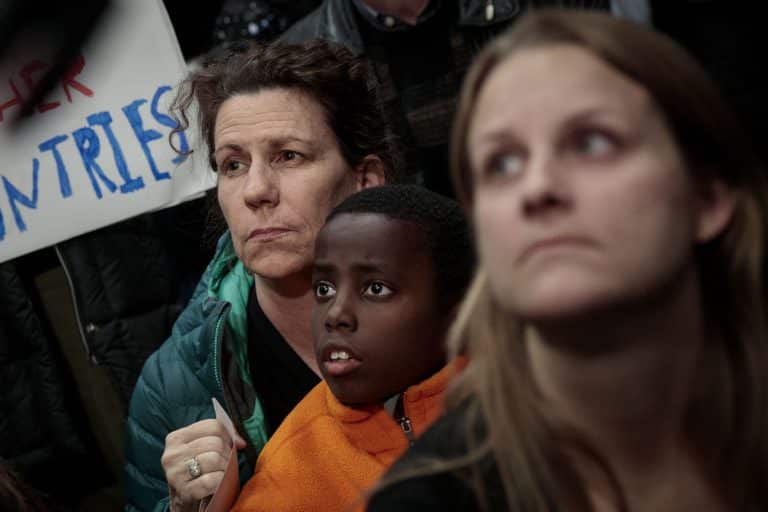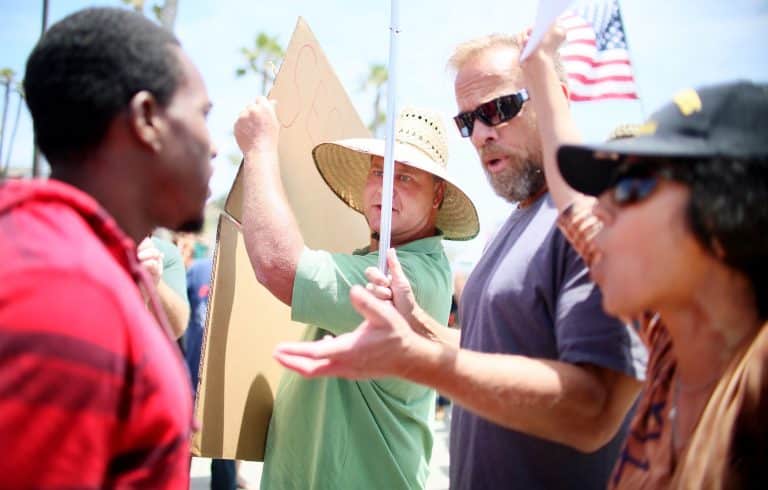
Image by Drew Angerer/Getty Images, © All Rights Reserved.
The Color of Urgency
As images of Saturday night’s spontaneous airport protests began to flood in through my Twitter stream, I was elbow deep in sparkle glue and Perler beads, recovering from an illness, and feeling desperate about the state of the world. I texted with friends who managed to get to San Francisco International and JFK, thanking them for their motivation, learning about the palpable sense of urgency and love they were experiencing.
When news broke that the ACLU, among other organizations, had managed to get a stay against what I will unapologetically refer to as the Muslim ban, I felt a wave of relief pass through my body unlike anything I have felt since Donald Trump’s election.
The rule of law still stands.
People still show up and stand up for what is right.
All is not lost.
Maya and I made a love note for our local mosque and John and I donated to the organizations that had won the night. I went to bed feeling like this was our new normal, and that in fact, that was okay. As long as it still feels like checks and balances actually have a shot at protecting us from this chaotic, amoral administration, and as long as people are willing to come together to protect what we hold sacred, we will be okay.
But I woke up with a tickle in the back of my throat. Soon it became a scratch. And finally it was an un-ignorable pain.
I realized that we — meaning white people, privileged people, Silicon Valley billionaires, intellectual literati, lawyers — showed up in droves when the give-us-your-huddled-masses narrative was threatened. We, in fact, went to the most dreaded, inconvenient public space anywhere — airports! — to make our allegiance to this narrative and its consequences known.
I can’t help but wonder how many of these same people were at Black Lives Matter protests. How many of us have considered the discrimination, criminalization, and even death of American citizens of color an emergency worthy of disrupting our Saturday night plans? In Michael Eric Dyson’s recently released book, Tears We Cannot Stop: A Sermon to White America, he writes about some of the subtleties of Martin Luther King’s message that have been lost over the years:
“King concluded that black suffering has generated a ‘terrible ambivalence in the soul of white America.’”
It is that ambivalence that keeps us operating as if everything is normal when a 12-year-old boy is gunned down while playing in a park in Cleveland. It is that ambivalence that allows us to stick to our appointments and sitcoms while schools dramatically re-segregate. It is that ambivalence that has us talking about maternal mortality in Southern Africa, but rarely mentioning the racial disparities here at home.
It should be said that a policy this overt, this sudden, this chaotic, logically leads to a swift and concrete response. President Trump essentially operationalized the hateful and ignorant idea that a whole body of people is immediately dangerous based simply on their religious identification. That hate codifies in customs — a place where we can actually show up with our protest signs and our righteous indignation.
The hate and ignorance that President Trump and those that surround him reserve for black Americans — at least so far — has not lent itself to the same easy urgency. As a friend of mine pointed out, anyone who has organized knows that it’s always easier to stop something and mobilize on behalf of what is than on behalf of what might be.
But even so, how much more un-subtle a narrative breach (“police are here to serve and protect”) could we find than that caught on film in the police shootings of Sandra Bland or Eric Garner? One might argue — but where would the good people have shown up to make their outrage known? Well, police stations, for starters. Aren’t they the parallel to airports in this case?
Of course, many of us have been showing up in the streets in the last year or two to proclaim that black lives matter, but in nowhere near the numbers or with nowhere near the clarity that we experienced on Saturday night.
I have hesitated to write this, even as I’ve hesitated to think this, because I want everyone motivated to counter this administration in any and every way that feels right. This is not a competition of causes or oppressions. The point is not to criticize that native moral instinct to get up and get somewhere with others, to say no in certain terms. The point is to say — we need more, not less of that. And we need it around issues that may not show up in executive orders or those that are not embodied by innocent children or elders detained for hours and then released into the loving arms of their family members.
Most importantly, we need it not just when the narrative being threatened is our best story, but when the narrative being denied is our worst story. Both are true. Yes, we have welcomed immigrants and refugees, and yes, this is part of what makes us the country that we are. But yes, we have also committed genocidal violence to those who were here long before us, and we have enslaved a whole population of people who we forcibly brought here. For 12 generations. That’s America, too. Lady Liberty and Stephen Duncan. Dyson writes,
“The golden age of the past is a fiction, a projection of nostalgia that selects what is most comforting to remember. It summons a past that was not great for all; in fact, it is a past that was not great at all, not with racism and sexism clouding the culture. Going back to a time that was great depends on deliberate disremembering.”
We must interrogate our own ambivalence. We must resist our own tendency to disremember. We must recognize that we “good white people” are actually on a continuum with President Trump, that all white people are responsible for racism.
If the resistance is going to transcend the level at which President Trump is functioning, we must be willing to not only counter his obvious moral and systematic failures, but his adolescent, dualistic thinking. America is both great and terrible. It has succeeded wildly at welcoming some people and has not only failed others, but exploited and criminalized and murdered them. All of this is why we showed up at The White House lawn and at airports. And why we must show up at police stations and hospitals and schools and prisons in the coming days.
We must show President Trump that the majority of Americans understand that our greatness is not born of innocence or inherent moral purity, but of courageous honesty and the imperfect quest for collective healing.

